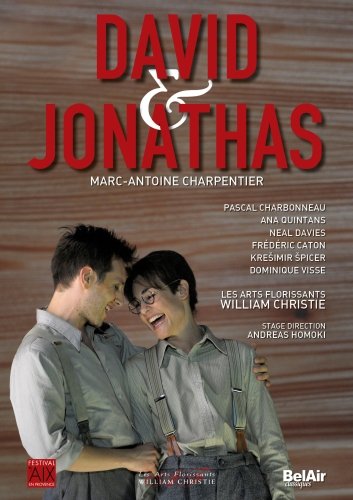CHARPENTIER David and Jonathas
Christie and Homoki’s collaboration from Aix
View record and artist detailsRecord and Artist Details
Composer or Director: Marc-Antoine Charpentier
Genre:
Opera
Label: Bel Air Classiques
Magazine Review Date: 09/2013
Media Format: Digital Versatile Disc
Media Runtime: 130
Mastering:
DDD
Catalogue Number: BAC093

Tracks:
| Composition | Artist Credit |
|---|---|
| David et Jonathas |
Marc-Antoine Charpentier, Composer
(Les) Arts Florissants ensemble Ana Quintans, Jonathas, Soprano Dominique Visse, La Pythonisse, Countertenor Frédéric Caton, Achis, Bass Kresimir Spicer, Joabel, Tenor Marc-Antoine Charpentier, Composer Neal Davies, Saul, Bass Pascal Charbonneau, David, Tenor Pierre Bessière, Ghost of Samuel, Bass William Christie, Conductor |
Author: David Vickers
William Christie claims that since their 1988 recording, Les Arts Florissants have become more experienced in performing at low French Baroque pitch and no longer cast countertenors in high tenor parts. Canadian haute-contre Pascal Charbonneau sings David’s softer sentimental music mellifluously – most notably the exiled David’s reluctance to face his own people in war (Act 1’s ‘Ciel! Quel triste combat en ces lieux me rappelle?’). Two disconsolate soliloquies in Acts 4 and 5 are profoundly moving: Ana Quintans emotively conveys Jonathan torn between filial (and political) duty and his loyalty to David (‘A-t-on jamais souffert une plus rude peine?’), and David’s lamentation over his beloved Jonathan’s body is devastating. Christie supervises an authoritative performance – although it is an uneasy incongruity that the drabness of the production (cloth caps and trilbies for Israelites; fezzes for Philistines) is at odds with a few sensuous pastoral passages and a victorious final chorus (which is predictably undermined by ironic stage action).
Discover the world's largest classical music catalogue with Presto Music.

Gramophone Digital Club
- Digital Edition
- Digital Archive
- Reviews Database
- Full website access
From £8.75 / month
Subscribe
Gramophone Full Club
- Print Edition
- Digital Edition
- Digital Archive
- Reviews Database
- Full website access
From £11.00 / month
Subscribe
If you are a library, university or other organisation that would be interested in an institutional subscription to Gramophone please click here for further information.




